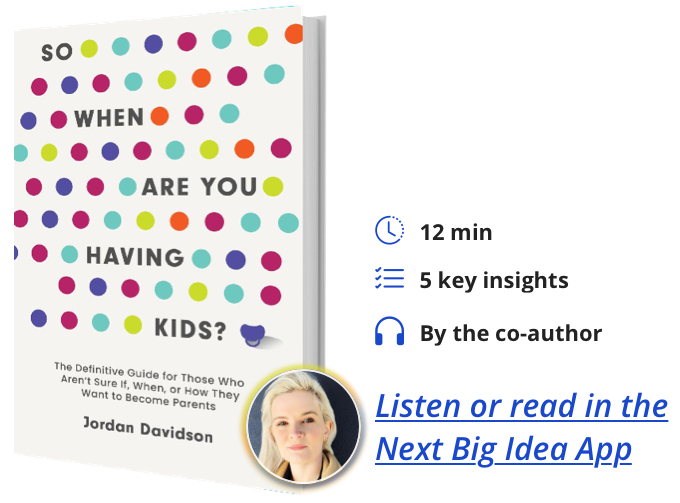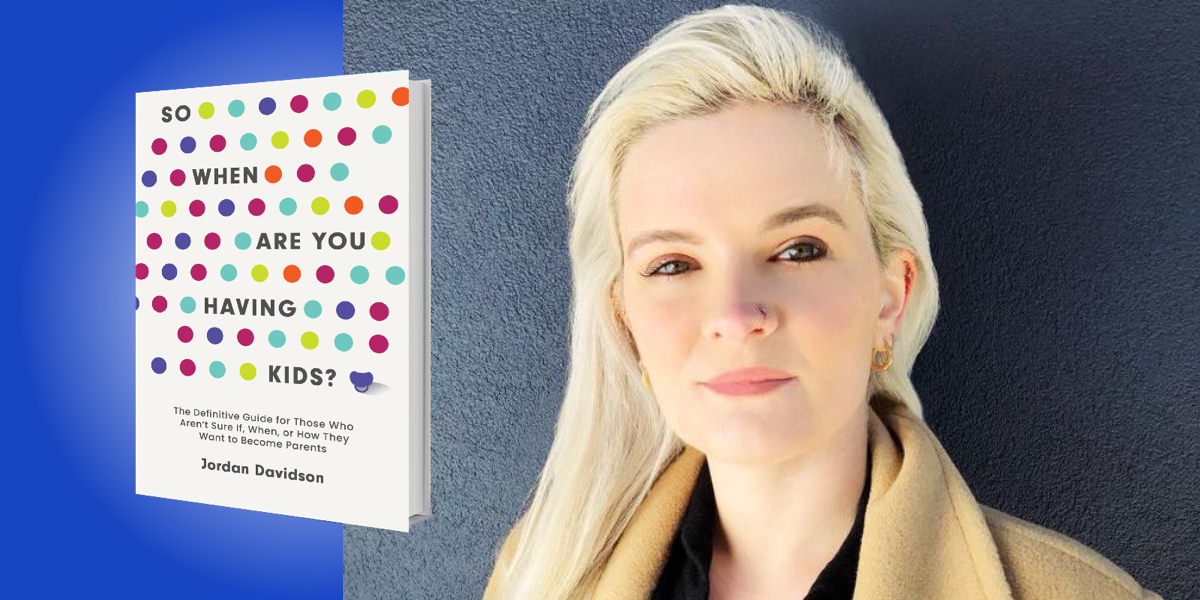Jordan Davidson is a health journalist and reproductive health advocate whose writing has appeared in Parents, Health, Men’s Health, Prevention, Teen Vogue, BuzzFeed, Upworthy, among others.
Below, Jordan shares 5 key insights from her new book, So When Are You Having Kids: The Definitive Guide for Those Who Aren’t Sure If, When, or How They Want to Become Parents. Listen to the audio version—read by Jordan herself—in the Next Big Idea App.

1. Children provide a set path in a world full of uncertainties.
Children provide what researchers call “uncertainty reduction.” Do you know what the next 18 years of your life will look like? If you don’t have kids, you might not. But if you do, then you have a pretty good idea of what to expect. Having kids puts you on a set path, and that can be very enticing.
Humans are naturally inclined to want to reduce uncertainty. We do this in one of two ways: we collect information so that we can make decisions with as little risk as possible, or we pick courses of action that have a predictable set path. Taking the time to research and deciding whether parenthood is right for you is that first type of uncertainty reduction—collecting information so that you can make a decision with as little risk as possible.
Deciding to have children, without any research, is the second form of uncertainty reduction. Children put us on a set path because they are a long-term obligation. When you have children, it is assumed you will care for them for at least the next 18 years. So while you might not know what your future holds, you at least know that raising a child will be part of it.
2. Deciding whether to have kids is, in part, an unconscious process.
When scientists study people’s childbearing intentions they often use a model called the “theory of planned behavior.” Essentially, deciding whether to have kids comes down to your perceptions of the benefits and costs of having kids, social influences (like pressure from family members), and whether you think you’d be able to parent successfully. There are other factors at play too, like personality, age, education, income, race, and religion that influence the pressures you feel and your perception of parenthood.
“Intentions don’t always predict behavior, and critics of this model say that childbearing might be more of an unconscious process.”
This model is not perfect. After all, how can scientists predict intentions when nearly half of U.S. pregnancies are unintentional. Intentions don’t always predict behavior, and critics of this model say that childbearing might be more of an unconscious process.
Our brains understand the world through schemas, patterns of thought we use to categorize the world. If I invite you to a birthday party, you’re going to have some sense of what that entails. Your schemas allow you to process that there likely will be cake, presents, and some off-key singing. These types of associations also exist when it comes to how you think about parenthood.
Our schemas paired with social context, norms, circumstances, and the influence of others, affect our intentions and behavior.
Intentional or unintentional, deciding whether to have kids depends on how you both consciously and unconsciously view the world. Therefore, making a decision that you feel good about requires a deep understanding of not only yourself but the societal norms and external factors that shape your thought processes.
3. There is no perfect test of fertility.
The first thing to know before you even set foot in a fertility clinic is that there is no perfect test of fertility. You can have infertility, which is defined as the failure to conceive within one year, with “perfect” test results, and you can get pregnant even with abysmal ones. Fertility tests that measure your ovarian reserve don’t predict your likelihood of getting pregnant, they predict how well your body will respond to fertility treatments. These tests measure the quantity of eggs, not the quality. There is no test for quality; the best indicator we have is age.
“Fertility tests that measure your ovarian reserve don’t predict your likelihood of getting pregnant, they predict how well your body will respond to fertility treatments.”
Semen analyses also can’t predict fertility unless you have zero sperm in your semen, what’s known as azoaspermia. If you have one abnormal test, your doctor will likely encourage you to get a second one a month later.
4. There are two types of regret when it comes to having kids.
It’s incredibly difficult to study regret among parents because it’s taboo to admit you regret having kids. When parents experience regret, it’s often because their expectations of parenthood don’t align with the realities.
There are two types of regret. Some people regret having children altogether, while others regret the circumstances associated with having children. Those who regret having children tend to view their children as difficult, perceive themselves as bad parents, or mourn the lives they had before children.
Whereas those who regret the circumstances often wish they could change when they had kids, how many kids they have, the sacrifices associated with parenthood, their partner, or society.
5. Having kids won’t make you happy unless you think it might.
Having kids leads to a boost in satisfaction, but that boost doesn’t last throughout one’s life span. Studies using data from the UK, Germany, and Australia found increases in life satisfaction among both cisgender men and women during pregnancy and the first year of parenthood. However, those increases returned to pre-pregnancy levels within the first two years of their child’s life. The relationship between happiness, wellbeing, and kids is complex.
“Parents reported more joy as well as more stress, experiences that tend to cancel each other out.”
Looking at a sample of 1.8 million Americans, researchers found little difference in subjective well-being between people with and without children. Parents reported more joy as well as more stress, experiences that tend to cancel each other out. Parents who reported higher well-being were also more likely to be married, richer, better educated, more religious, and healthier, all factors that increase well-being irrespective of having kids. When researchers adjusted their analysis to control for these factors, they found parenthood led to a small negative association with life evaluation, with more positive and negative effects on pleasure.
The researchers concluded their study by noting that if people wished to make their lives “as good as possible” and could visualize their lives with and without children in an unbiased way, then those who believe their lives will be enriched by children despite all of the challenges will likely feel satisfied with their choice. Similarly, those who feel their lives are complete without children won’t regret forgoing parenthood.
Think of it this way: If I tell you I’m going to give you $100 and only give you $50, you’d likely feel disappointed. But if I tell you I’m going to give you $25 and then give you $50, you’d be happy. In both scenarios you get $50; making happiness not about the value, but the expectation.
Ultimately, making a decision that works for you is all about setting expectations, realistic ones that factor in your individual feelings, your environment, and the demands of parenthood.
To listen to the audio version read by author Jordan Davidson, download the Next Big Idea App today:
































